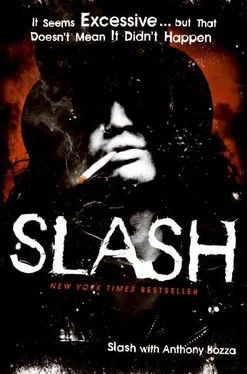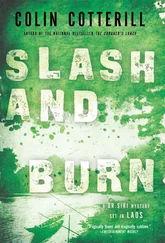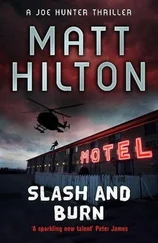At this point I could now see that his mental and physical health had become a bit questionable. Under the circumstances it was forgivable, but I think somewhere along the line we’d forgotten that Steven was the type who needed somebody to look out for him all the time. He was like a curious kid you couldn’t leave alone in the house, whereas the rest of us were the kind of people who had a sustainable way of doing things. You could do whatever you wanted to yourself, but you had to carry your own weight; you could make your own mistakes, but you had to deal with the repercussions. That was the way it worked with us.
Until our return from the Appetite tour, the years leading up to this had been casual fun drug-wise, more like recreational consumption. None of it had any real baggage or so we thought, but at this point it had taken its toll. Once I saw how dark it was getting, I pulled myself out. Steve didn’t have the wherewithal to see it as clearly or take steps to change it. He was in such denial, but it was tough for any of us to come down on him, even for Duff, who still did coke. Steven just didn’t have all his faculties and couldn’t maintain a line between his excesses and his productivity.
We did what we had to do to get him back on track, but you couldn’t tell Steven anything. He would argue and then throw it back in your face. (In fact, to this day he is still arguing about why he got kicked out of the band.) Sometimes I’d think that I’d gotten him to a place where he could understand… then he’d pull a stunt like not showing up for a rehearsal. It was impossible to reason with him—with anyone, I guess, in that state of mind. And, really, emotionally Steven wasn’t much older than a third grader, a sixth grader tops.
Now, trying to curtail Steve’s abuse was an awkward situation, to say the least: here I was, the pot calling the kettle black, me, Mr. Recently Clean, who still drank, laying down the law to Steven. I was doing nothing more than criticizing my mirror image from the other side of the mirror. I knew there was some hypocrisy involved, but I didn’t care—the difference between Steve and me, no matter what our chemical diet consisted of, was that I was aware of my limitations. Unfortunately he wasn’t, and Guns N’ Roses needed to move forward at all costs.
Like Izzy and myself, Steven had slipped and lost his footing in a pile of cocaine and heroin, but unlike us, he couldn’t regain his balance. We’d go over to his place in the afternoon to try to get him to come to rehearsal and his eyes told us all we needed to know: they’d be tiny black pin dots that were way too easy to see against the blue iris of his eyes. He’d sit there insisting that he wasn’t on smack, that he was just drinking and doing a bit of cocaine, but we knew differently. It didn’t help his cause that Duff and I always found his stash; he generally kept it either behind the toilet or behind his bed. There was no one else keeping tabs on him but us; he’d had a girlfriend but they’d split up, so he was living alone as he went off the deep end. We made a number of attempts at rehab, and we did get him to check in to Exodus more than once. Every time he did, though, we’d get a call that he’d scaled the wall or run off out some back door. Of course whenever he did that, he’d be predictably irretrievable for the next few days. It must be some kind of record: in total, during this period, Steven escaped rehab twenty-two times. Duff and I stuck by him, but we knew that it was a matter of time before he wore down whatever goodwill the rest of the band had toward him.
Meanwhile, somehow Axl and I had become civil again and were both excited about getting to work on a new record—I guess it was fishing season again. Axl knew I’d succeeded in getting off heroin, and was committed to staying off it. After so many false starts, Axl, Duff, and I started to regain our sense of unity and Izzy wasn’t too far behind. We were all glad to see him when he showed up at Mates. He wasn’t there every day, maybe two days on one day off, but we worked around all that. Izzy is just so easy to get along with.
He jammed with Duff, Steven, and me on a few new songs, and in those instants the old energy came back and it all became very exciting and electric.
We all gathered at my house, and wrote more than half of both Illusions albums on acoustics, literally in two nights. We started off by going through the stuff we had from the old days that we’d never done anything with. We reintroduced “Back Off Bitch” and “Don’t Cry”; we had “The Garden,” a song that Axl and Izzy wrote with West Arkeen. “Estranged” was a song that Axl had been working out on piano for a long time—he’d been playing the same parts over and over in Chicago and afterward; it was clear that it was working itself out in his head. I had started writing guitar parts for it back in Chicago, so it came together in no time once we focused on it.
“November Rain” had been ready to go on Appetite for Destruction, but since we already had “Sweet Child o’ Mine,” the majority of us agreed that we didn’t need another ballad. Besides, the original demo of that song was eighteen minutes long give or take, and none of us cared to conquer it in the studio at that point. It had been a song that Axl had tinkered with for years, whenever there was a piano present; it had been around forever, and it was finally getting its due. Axl had been annoyed when Tom Zutaut suggested that we hold it until the next album, because that song meant a lot to him. He let it go, though he resented that decision for years.
We’d had the rough framework for “Civil War” kicking around since that first tour of Australia; I wrote the instrumentals, and Axl had written and revised the lyrics for it several times, but everything fell into place when we brought it out again. “You Could Be Mine” was another track that wasn’t new: it was written during the Appetite sessions and I always felt that it should have been on that album, because it is more reminiscent of that time than anything else on the Use Your Illusion albums.
We had spun our wheels for a long time, but over that couple of nights at the Walnut House, the creativity at the base of our band chemistry came back to us: Izzy and I both brought out a few rough ideas, and before we knew it, we’d all contributed to developing them into complete songs. I had a track called “Bad Apples” that was fresh from Chicago, along with “Get in the Ring,” which Duff had written the music for. Everyone jumped on those right away, as well as a long, heavy guitar-riff mantra I wrote when living with Izzy that evolved into the song “Coma.” The song was eight minutes long; it was just a repeating pattern that got increasingly mathematical and involved in its precision as it progressed. Axl loved it but at first it was the one song that he couldn’t come up with the lyrics for. He was very proud of his gift for lyrics, so he was pretty frustrated by it… until one night months later when the words just came to him. We finished another epic number I’d begun with Izzy called “Locomotive.” And there was “Dead Horse,” a tune which Axl had done the guitar and lyrics for years earlier before we’d ever met. Duff brought in “So Fine,” complete with music and lyrics. Before long, we realized that we had more than enough songs for an album. In a few sessions, we managed to pull all of that material together quickly and relatively painlessly.
I still had no idea why it had taken us this long, but it was clear that as soon as we took a second, put the bullshit aside, and got together without animosity, we fell naturally right back into the band vibe.
The thing that’s funny about the Illusion records is that aside from a couple of songs there are no really dramatic arrangements on them at all, because we threw them together real quick. The ones I brought in, like “Locomotive” and “Coma,” were fully arranged from the start when Axl wrote lyrics to them. With the exception of the piano epics, the rest of the songs were really simple and didn’t need much working out. We didn’t spend afternoons debating how many times a bridge was needed in a song or coming up with tricky chords for a breakdown. Once we got together again, we were in such a good mind frame as a band, just hanging out together for the first time in quite a while. We were all getting along really well, so it was all fun again.
Читать дальше
Конец ознакомительного отрывка
Купить книгу




![Сол Слэш Хадсон - Slash. Демоны рок-н-ролла в моей голове [litres]](/books/387912/sol-slesh-hadson-slash-demony-rok-n-thumb.webp)


